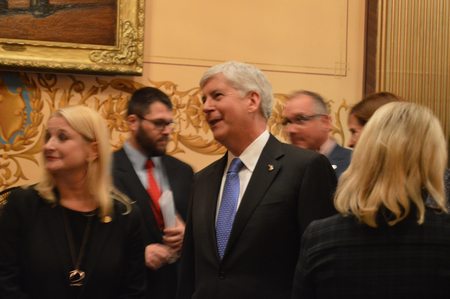New Report Raises Questions About Snyder Administration Relationship with Line 5 Operator
A recent investigation finds that Gov. Snyder’s office coordinated with Enbridge to form policies and press releases on Line 5.

The Line 5 pipeline carries petroleum products 645 miles from Wisconsin to Ontario in two pipes that sit in the water along the lake bed.

A new report from the Michigan Campaign Finance Network and Bridge Magazine raises concerns about the relationship between the office of Governor Rick Snyder and Enbridge, the company the owns the Line 5 Pipeline.
The investigation shows that “Michigan leaders have allowed lobbyists and officials with direct relationships to Enbridge to offer extensive input about the fate of the pipeline.”
Here are three highlights from the investigation in an article from Bridge Magazine:
- The Snyder administration provided lobbyist Deborah Muchmore, who is doing contracted with Enbridge and is married to Snyder’s former chief of staff Dennis Muchmore, an opportunity to preview the state’s press release and talking points on new safeguards on the pipeline.
- Enbridge’s Michigan lobbying firm, Kandler Reed Khoury & Muchmore also employs Brad Wurfel, the former communications director for the Department of Environmental Quality who resigned during the Flint Water Crisis after his controversial comments. Wurfel is also currently leading the training of officials in the Michigan Department of Agriculture and Rural Development.
- Valerie Brader, the former energy director and a former co-chair of the Pipeline Safety Advisory Board, left Snyder’s administration in January to become a registered lobbyist for a consulting firm advertising services to energy industry clients. The state later hired Brader’s firm in April to provide outside counsel on Line 5.
Detroit Today host Stephen Henderson speaks with Craig Mauger, executive director of the Michigan Campaign Finance Network, and Jim Malewitz, a reporter at Bridge Magazine, about the process and findings of their joint investigation.
On the Snyder administration sharing a preview of the talking points and press release for the pipeline:
“People that used to work at the DEQ [Department of Environmental Quality] said it was a little eyebrow-raising to get the talking points and there’s even some language in the emails suggesting ‘if you have anything that you might want to see changed, let us know.,” says Malewitz. “So some of the language was a little bit unusual.”
On the limitations of FOIA to get this kind of information:
“Because Michigan is just one of a couple states that exempt both the legislature and the governor’s office from the Freedom of Information Act,” says Mauger. “So the documents that we were able to get—5,000—are likely just a piece of the overall communications about this line 5 that are out there.
On why the state with is in a difficult position:
“One of the problems the state’s running into is that a lot of people they are hiring or working with on the safety of line 5 have some connection to Enbridge,” says Mauger. “There aren’t a lot of people that don’t have some connection to Enbridge that they could potentially hire.”
“The expertise, the information that they need to get about what’s going on with line 5, they’re pretty much dependent on Enbridge to provide that information.”
Click on the audio player above for the full conversation.
